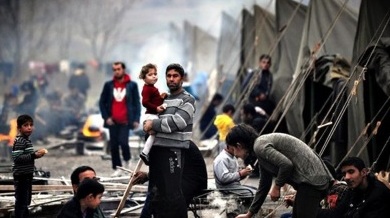[Commentary]
We turn our attention to Europe, compelled by shocking images of refugees’ deaths.
To the stories of the stateless having identification numbers written on them and told their trains are headed to a safety, rather than camps. Eerie reminders from the past merge with disturbing pictures of the present.
What will be the refugees’ future? War has uprooted half of Syria’s population, creating 4 million international refugees, with tens of thousands more fleeing to Europe to escape humanitarian crisis or armed conflict from Afghanistan, Eritrea, Nigeria, Iraq, Somalia, Pakistan and Sudan.
Inspiringly, Uruguayan President Jose Mujica is opening his summer home to 100 children, while Pope Francis calls on parishes and religious communities to provide shelter. Yet globally few nations are doing enough.
The US has accepted less than 1,500 Syrians, although President Obama has pledged to increase it to a nominal 10,000. A European Commission plan advances to settle 160,000 in the European Union. Many European nations, including Germany, are pledging to do much more, yet others insist the migrants apply for asylum in the first safe country they reach (often an overloaded Greece), pushing back on proposed mandatory quotas. (There is something absurd in watching countries who colonized or controlled much of the world now protecting borders.)
It’s déjà vu all over again. When did this happen? “Fifty percent of the victims of this crisis are kids,” said European Union Commissioner in Kristalina Georgieva said at the New America Foundation. “When I close my eyes and think of the Syria crisis, I don’t see the face of a soldier or a rebel. I see the face of a girl or boy.”
At the time, she also pleaded for us to “keep our hearts open, our wallets open, our borders open because this is an extraordinary crisis.” United States Secretary-General Ban Ki-Moon called the civil war and its consequences “a humanitarian crisis of unprecedented proportions in recent history.”
The answer: all statements were made in 2013. At the time, 2 million Syrians had become international refugees (of a total of 6.25 million displaced), overwhelming small neighboring countries. In this millennium also, the invasion and destabilization of Iraq led 4 million (1 in 6) to flee their homes. And there are those today too who, but for mostly closed borders, would leave their countries.
Very few of the homes and facilities destroyed in the 2014 Israel-Gaza conflict have been rebuilt one year later. The UN warns Gaza could become “uninhabitable” in just five years. In another assessment, a United Nations-backed construction authority says it could take 20 years to undo the damage wrought in just 50 days. Construction materials are restricted through blockades by Egypt and Israel, two countries that are major recipients of US aid.
The situation is reminiscent of Western sanctions that led to over a million Iraqi deaths after the destruction of its infrastructure, in what some leaders call a genocide. In Yemen, an estimated 80 percent of civilians now require humanitarian assistance, half of them children, six months after the Saudi invasion.
The Saudi military dropped cluster bombs on civilian areas that are illegal under international convention, even as the U.S. is working to finalize a new arms deal in an apparent violation of the Leahy Law, which bars the US from sending arms to military units with major human rights violations.
Much of what we see today has precedence and relevance. Are we up to the challenges? The Immediate Crisis — Additional humanitarian assistance must be provided for those displaced inside their nation and abroad, especially by the Western world.
While almost a million are expected in Europe this year, 86 percent of the world’s 20 million refugees are in developing countries. The severely underfunded UN appeal for Syria must be supported, horrific conditions are already leading some to return to chaos.
A full implementation of the plan to resettle refugees concentrated in Hungary, Italy, and Greece should receive commitment through the EU, with the stepping up of relatively weak commitments globally.
Please see Nationofchange.org


















